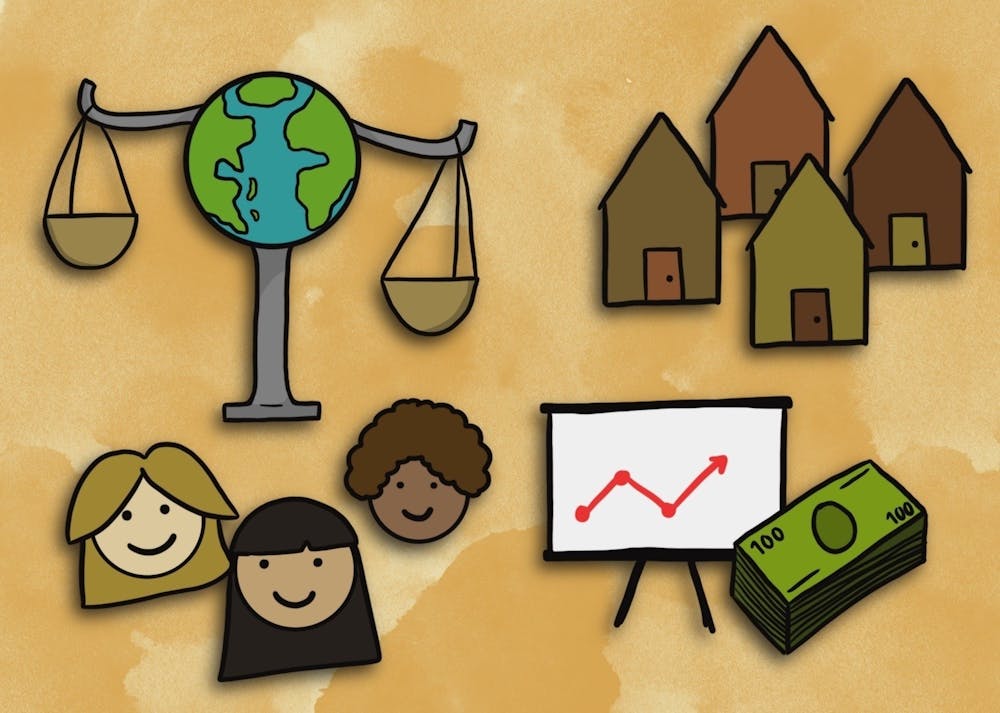After input from residents, the city of Tempe has divided its Climate Action Plan into four new agendas rather than two focus areas: business, youth, climate justice and neighborhoods. Each agenda has their own goals and staff dedicated to their subject.
The Climate Action Plan (CAP) is a guideline created by the city to mitigate greenhouse gas emissions and climate change impacts. The plan works in conjunction with other city priorities to address the local impacts of global climate change.
The plan was originally drafted in 2019 and the city has used multiple outreach programs, including one developed by ASU graduate students, to create the guiding principles of the final plan, with specifics included in the agendas.
The "HSD 598 - Topic: Equity in Climate Action" ASU class created climate stories during the Spring 2021 semester for the city to place in public parks, where residents can read about the coming effects of climate change and how they themselves could give input to the CAP. The students wrote a final report at the end of the semester to give their recommendations for the update.
READ MORE: Climate stories invite feedback to update the Tempe Climate Action Plan
Marta Berbés-Blázquez, an assistant professor at the School for the Future of Innovation in Society and the College of Global Futures who taught the equity in climate action course, described how listening sessions designed by the students successfully informed the climate stories they created and shared with the public.
"Those listening sessions were successful on many levels," Berbés-Blázquez said. "We were expecting 10 people to show up, we had like 50 people in the first one and maybe 40 in the second one."
Jordan King, a graduate student studying sustainability, took the class and said their final report was a culmination of feedback students had gotten from their climate stories, listening sessions and the personal recommendations of students in the class.
These students influenced the implementation of the youth agenda, as their personal recommendations made a point to suggest more youth should be involved in the CAP.
"Having more different perspectives on this, not just focusing on what businessmen want, but what youth in the community and people who are really passionate about this, what they think should be done, too, is really important," King said.
According to a presentation on the CAP given to city council on Sept. 14, the purpose of the youth agenda is to "provide a space for Tempe youth and students to feel empowered to share their thoughts and advice with the City of Tempe regarding the youth agenda."
One of the proposed actions in the youth agenda is transportation equity, something the students included in their recommendations after speaking with residents. The transportation equity action proposes implementing free or affordable transportation options and increasing shade availability at transportation centers.
READ MORE: Tempe Streetcar will open in 2022 with uncertain transit benefits
"People were really interested in wanting to be able to use public transportation more but felt like with the heat and just not great setups, sometimes that wouldn't happen," King said. "So there was a lot of information we got that focused on public transportation, one key solution they offered was to have these covered spaces."
Some of the youth agenda is geared toward K-12 schools, with action items such as creating community gardens and installing composting sites at schools.
Braden Kay, the director of sustainability at the city of Tempe said his office will now be focusing on getting the action items from each agenda implemented.
"We now plan to make budget requests for programs, policies and infrastructure that supports our existing highlight actions and new actions that come from the four agendas," Kay said in an email.
The three other agendas – climate justice, business and neighborhoods – also include their own action items, ranging from heat awareness and resilience to energy efficiency and water conservation.
READ MORE: Tempe, ASU program collaborate in efforts to aid people without housing
King said he thinks the update to the CAP will prove effective because of the input the city sought from members of the community.
"I think this idea of keeping equity and justice as the core values helps to make some of the solutions that they're thinking about more effective for a wider range of people, which is really important," King said. "Because sometimes in these processes, the people who are thinking about this and trying to make policies take action, that's not what they're thinking about, necessarily."
Reach the reporter at rpriest2@asu.edu and follow @reaganspriest on Twitter.
Like The State Press on Facebook and follow @statepress on Twitter.
Continue supporting student journalism and donate to The State Press today.

Reagan Priest is a managing editor, overseeing and working with the six digital desks at The State Press. She previously worked as a social justice reporter for Cronkite News and as a digital production intern at The Arizona Republic.




